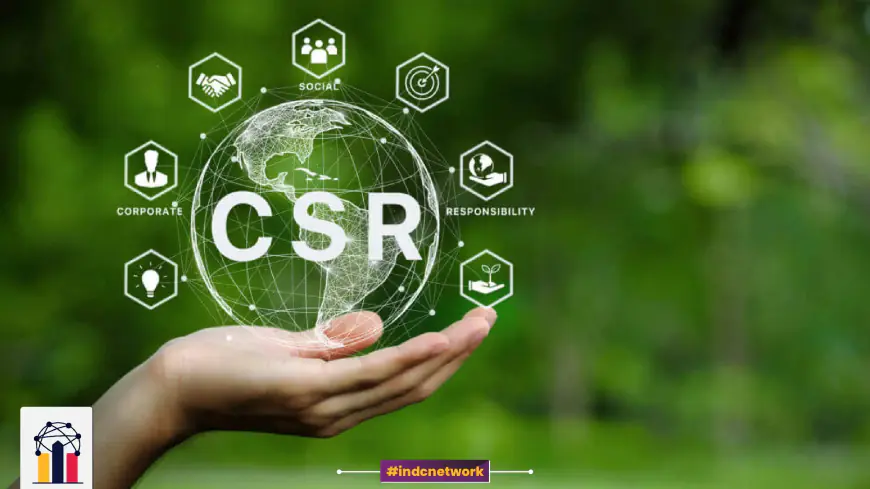Corporate Social Responsibility: Unveiling the Hidden Forces Behind Modern Business Ethics and Impact
Corporate Social Responsibility (CSR) is a pivotal element in modern business practices, intertwining ethical considerations with corporate strategy. This article delves into the multifaceted nature of CSR, exploring its evolution, key components, and the impact it has on businesses and society. By examining real-world case studies and assessing the challenges and opportunities in implementing CSR initiatives, we uncover how CSR drives not only ethical behavior but also business success and community development.

INDC Network :Business :Corporate Social Responsibility: Unveiling the Hidden Forces Behind Modern Business Ethics and Impact
In an era where corporate behavior is under unprecedented scrutiny, Corporate Social Responsibility (CSR) stands as a beacon of ethical commitment and community engagement. Once considered an optional add-on, CSR has evolved into a central component of corporate strategy, influencing everything from brand reputation to employee satisfaction and financial performance. But what drives this shift, and how do companies navigate the complex landscape of CSR?
This article explores the multifaceted world of CSR, examining its origins, key elements, and the real-world impact it has on businesses and society. We will investigate how CSR has become a crucial part of modern business ethics, analyze successful CSR initiatives, and address the challenges companies face in implementing these practices. By understanding CSR’s evolving role, we uncover how businesses can align ethical responsibility with strategic goals to create lasting value for all stakeholders.
The Evolution of Corporate Social Responsibility : Corporate Social Responsibility has its roots in the early 20th century, but its modern concept began to take shape in the 1960s and 1970s. The term itself emerged as businesses faced increasing pressure to go beyond profit-making and address social and environmental concerns.
1. Early Beginnings : In the early 20th century, social responsibility was often seen through the lens of philanthropy. Wealthy industrialists like Andrew Carnegie and John D. Rockefeller used their fortunes to support charitable causes, believing that successful individuals had a duty to give back to society. This form of CSR was largely voluntary and unstructured, focusing on donations and community support.
2. The Rise of Modern CSR : The concept of CSR began to formalize in the 1960s as social movements and activism brought issues like civil rights, environmental protection, and worker rights to the forefront. The publication of “Social Responsibilities of Businessmen” by Howard Bowen in 1953 is often cited as a seminal work that laid the groundwork for modern CSR thinking.
The 1980s and 1990s saw CSR become more institutionalized, with businesses starting to integrate social and environmental concerns into their operations. The development of global frameworks and standards, such as the Global Reporting Initiative (GRI) and the United Nations Global Compact, helped formalize and standardize CSR practices.
Key Components of Corporate Social Responsibility : CSR encompasses a broad range of activities and principles, reflecting the diverse ways companies can contribute to society. At its core, CSR involves balancing economic, social, and environmental considerations to create value for both business and society.
1. Environmental Responsibility : Environmental responsibility involves reducing a company’s ecological footprint and promoting sustainability. This includes efforts to minimize waste, reduce energy consumption, and lower greenhouse gas emissions. Many companies adopt environmentally friendly practices, such as using renewable energy sources, implementing recycling programs, and designing products with lower environmental impacts.
For example, companies like Patagonia and Unilever have made significant commitments to environmental sustainability. Patagonia’s “1% for the Planet” initiative donates 1% of sales to environmental causes, while Unilever has set ambitious targets for reducing its carbon footprint and improving resource efficiency.
2. Social Responsibility : Social responsibility focuses on the well-being of people and communities. This includes fair labor practices, human rights, diversity and inclusion, and community engagement. Companies with strong social responsibility programs invest in employee development, ensure safe working conditions, and support local communities through philanthropy and volunteerism.
A notable example is Google’s diversity and inclusion efforts, which aim to create a more equitable workplace by increasing representation and supporting employee resource groups. Additionally, Microsoft’s initiatives to bridge the digital divide through education and technology access demonstrate a commitment to social impact.
3. Economic Responsibility : Economic responsibility involves ensuring that business practices contribute to economic development while maintaining ethical standards. This includes fair trade practices, transparent financial reporting, and anti-corruption measures. Companies that prioritize economic responsibility work to ensure that their business practices benefit all stakeholders, including shareholders, employees, and customers.
Starbucks, for instance, emphasizes ethical sourcing through its Coffee and Farmer Equity (C.A.F.E.) Practices, which promote fair trade and sustainable farming practices. This approach not only supports farmers but also enhances the quality and sustainability of Starbucks’ coffee supply chain.
4. Ethical Governance : Ethical governance is about implementing robust systems and practices to ensure that business operations are conducted with integrity and transparency. This includes establishing codes of conduct, adhering to legal and regulatory requirements, and fostering a culture of ethical behavior.
Johnson & Johnson’s Credo, a statement of the company’s values and responsibilities to its stakeholders, is an example of how ethical governance can guide business decisions and actions. The Credo emphasizes the company’s commitment to customers, employees, communities, and shareholders, serving as a foundation for ethical decision-making.
The Impact of CSR on Business and Society : CSR initiatives can have profound effects on both businesses and society. Companies that effectively implement CSR strategies often experience enhanced reputation, increased customer loyalty, and improved financial performance. At the same time, CSR contributes to positive social and environmental outcomes, supporting community development and addressing global challenges.
1. Enhancing Reputation and Brand Loyalty : One of the most immediate benefits of CSR is the enhancement of a company’s reputation. Consumers and stakeholders are increasingly aware of corporate behavior and prefer to support businesses that demonstrate ethical and socially responsible practices. Positive CSR efforts can lead to stronger brand loyalty and differentiation in a competitive market.
For example, brands like Toms Shoes and Ben & Jerry’s have built strong customer loyalty by aligning their business practices with social and environmental causes. Toms Shoes’ “One for One” model, where each purchase supports a pair of shoes for a child in need, has garnered significant support from socially conscious consumers.
2. Attracting and Retaining Talent : CSR can also be a key factor in attracting and retaining top talent. Employees are increasingly seeking workplaces that align with their values and offer opportunities for meaningful contributions. Companies with strong CSR programs often report higher levels of employee engagement, satisfaction, and retention.
Salesforce, for instance, is known for its commitment to social responsibility and employee well-being. The company’s “Ohana” culture emphasizes family-like support for employees and community engagement, contributing to its reputation as a great place to work.
3. Driving Innovation and Long-Term Success : CSR can drive innovation by encouraging companies to develop new products, services, and business models that address social and environmental challenges. By focusing on sustainability and social impact, companies can identify new market opportunities and create competitive advantages.
For example, Unilever’s Sustainable Living Plan has driven innovation in product development and supply chain management. The company’s commitment to sustainability has led to the creation of new, environmentally friendly products and processes that contribute to long-term business success.
4. Contributing to Social and Environmental Development : Beyond business benefits, CSR initiatives contribute to broader social and environmental development. Companies that invest in community programs, environmental conservation, and ethical practices help address global challenges such as poverty, climate change, and inequality.
The Bill & Melinda Gates Foundation, though not a traditional corporate entity, illustrates the impact of philanthropic CSR efforts. The foundation’s work in global health, education, and poverty alleviation has had a significant impact on improving lives and promoting sustainable development.
Challenges in Implementing CSR : While CSR offers numerous benefits, implementing effective CSR programs comes with challenges. Companies must navigate complex issues, balance competing interests, and address skepticism from stakeholders.
- 1. Balancing Profit and Purpose : One of the main challenges in CSR is balancing profit with purpose. Companies must find ways to integrate social and environmental goals into their business models without compromising financial performance. This requires strategic planning, resource allocation, and a commitment to long-term value creation.
- 2. Measuring and Reporting Impact : Measuring and reporting the impact of CSR initiatives can be difficult. Companies must develop metrics and reporting frameworks to track progress and demonstrate the effectiveness of their programs. Transparency and accountability are crucial for building trust with stakeholders and ensuring that CSR efforts produce meaningful results.
- 3. Addressing Skepticism and Greenwashing : Skepticism about CSR can arise from concerns about “greenwashing,” where companies exaggerate or misrepresent their CSR efforts to appear more socially responsible than they are. To address this challenge, companies must ensure that their CSR initiatives are genuine, well-managed, and aligned with their core values.
- 4. Navigating Global and Local Issues : Companies operating globally must navigate diverse social, environmental, and regulatory issues across different regions. Implementing CSR programs that address local needs while maintaining global standards requires careful coordination and cultural sensitivity.
The Future of Corporate Social Responsibility : As the world continues to evolve, so too will the concept and practice of CSR. The future of CSR will likely be shaped by several key trends and developments:
- 1. Integration with Core Business Strategies : CSR will increasingly be integrated into core business strategies rather than being treated as a separate or secondary concern. Companies will focus on creating shared value by aligning their social and environmental goals with their business objectives.
- 2. Increased Focus on Social Impact : The emphasis on social impact will grow, with companies addressing issues such as inequality, human rights, and community development. CSR programs will focus on creating positive change and contributing to the well-being of society.
- 3. Enhanced Transparency and Accountability : Transparency and accountability in CSR reporting will become more important as stakeholders demand greater insight into corporate practices and impact. Companies will adopt more rigorous reporting standards and provide clearer information on their CSR activities.
- 4. Collaboration and Partnerships : Collaboration with governments, NGOs, and other stakeholders will play a crucial role in advancing CSR initiatives. Companies will work together with various partners to address complex global challenges and drive collective action.
Conclusion : Corporate Social Responsibility has evolved from a voluntary philanthropic activity to a fundamental aspect of modern business practice. By integrating ethical considerations into their operations, companies can enhance their reputation, drive innovation, and contribute to positive social and environmental outcomes. However, the journey toward effective CSR is not without challenges, and companies must navigate issues such as balancing profit with purpose, measuring impact, and addressing skepticism.
As businesses continue to face growing expectations from stakeholders and the global community, CSR will remain a vital component of corporate strategy. By embracing CSR as a core value and committing to genuine, impactful initiatives, companies can unlock new opportunities for growth, build stronger relationships with stakeholders, and contribute to a more sustainable and equitable world.
What's Your Reaction?













































































































































































